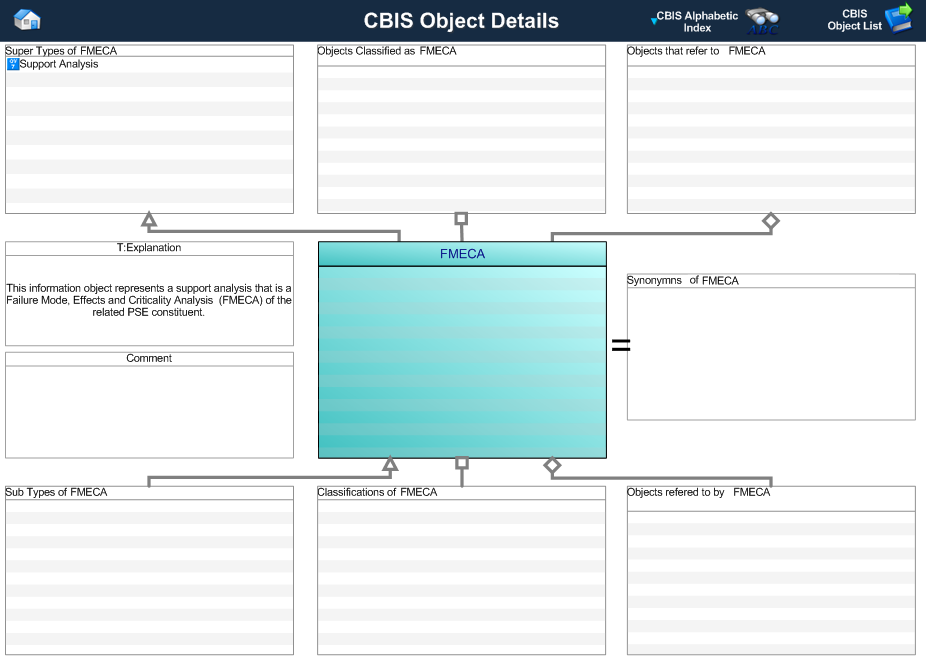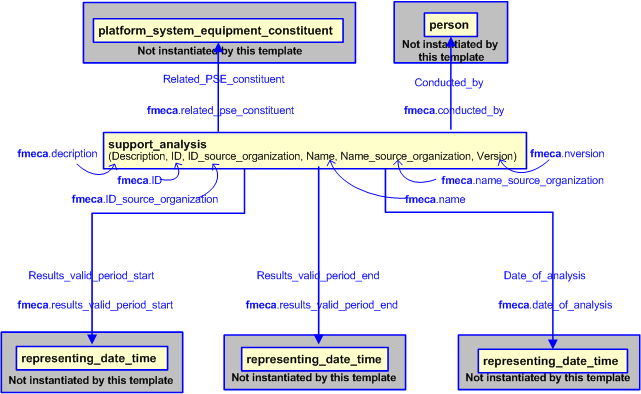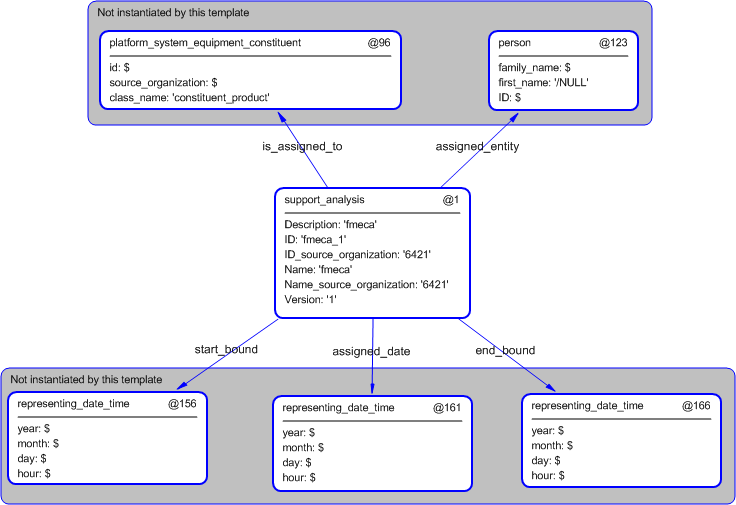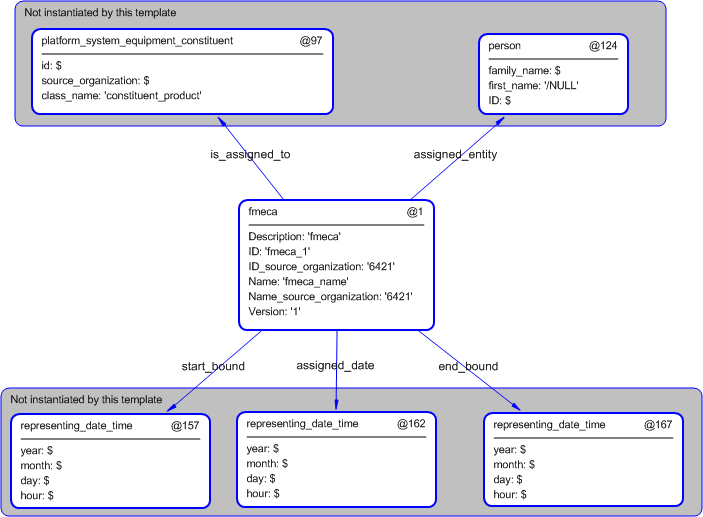Template:— fmeca (fmeca)
Context:— UK_Defence |
Date: 2010/03/15 11:22:12
Revision: 1.9
|
This section specifies the template fmeca.
NOTE
The template has been defined in the context of
UK_Defence.
Refer to the business context for details of related templates.
NOTE
An explanation of a template and the associated instantiation path is
provided in the
Template overview
section.
This template describes how to represent a support analysis that is a Failure Mode, Effects and Criticality Analysis (FMECA)
in terms of the PLCS model elements (templates, entities, and reference data).
This information object is a type of Support Analysis, where the results of each FMECA are recorded by means of relationships
from the information objects that are generated by the analysis and the FMECA object itself. For example, within the PSE Behaviour
DEX, a Failure Type object is related to a FMECA via the 'created by' relationship.
Figure 1 — Graphical Representation for Business Object fmeca
The definition of a fmeca object is:
This information object represents the record of a Failure Mode, Effects and Criticality Analysis (FMECA) of the related
PSE constituent having been conducted. The results of each FMECA are recorded by means of relationships from the information
objects that are generated by the analysis and the FMECA object itself.
|
Attribute name
|
Attribute description
|
Attribute type
|
Optionality
|
| No local attributes |
See CBIS supertype 'Support Analysis' for documentation of inherited attributes.
|
N/A |
N/A |
Table 1 — fmeca attribute details
The EXPRESS-G diagram in
Figure
2
shows the templates and EXPRESS entities that are required
to represent the template
"fmeca".
The text highlighted in blue shows the template parameters.
Figure 2 — An EXPRESS-G representation of the Information model for fmeca
The graphic for the template to be used in other EXPRESS-G diagrams
is shown in Figure
3
below.
Figure 3 — The graphical representation of the fmeca template
The following input parameters are defined for this template:
The reference to the person or organization that conducted the support analysis.
The reference to the date and time on which the support analysis was conducted.
The description of the support analysis. If this attribute is not required, the relevant
assigning_descriptor template should not be instantiated.
The identifier of the support analysis.
The identifier of the organization responsible for identifying the support analysis.
Name (Type='STRING', Optional)
The name of the support analysis. If this attribute is not required, the relevant
identifier template should not be instantiated.
The name of the organization responsible for identifying the support analysis. If this attribute is not required, the relevant
identifier template should not be instantiated.
The reference to the constituent of the platform system equipment that is the subject of the support analysis. If
this attribute is not required, the relevant
assigning_dated_effectivity template should not be instantiated.
The date and time until which the support analysis is valid.
The version of the support analysis.
The following reference parameters are defined for this template:
Allow the
Document
entity instantiated in this path to be referenced when this template is used.
Note: The
Document
entity can be referenced in a template path by:
%^target = $fmeca.fmeca%
where
target
is the parameter to which the
Document
is bound.
Allow the
Document_version
entity instantiated in this path to be referenced when this template is used.
%^target = $fmeca.fmeca_version%
The instantiation path shown below specifies the entities that are to be
instantiated by the template.
A description of templates and the syntax for the instantiation path is
provided in the
Templates Help/Information section.
-- support_analysis is abstract so use instantiation path directly -- Representing document /
representing_document(
doc_id=@ID,
doc_id_class_name='Support_analysis_identifier',
doc_id_ecl_id='urn:plcs:rdl:uk_defence',
doc_org_id=@ID_source_organization,
doc_org_id_class_name='Organization_name',
doc_org_id_ecl_id='urn:plcs:rdl:std',
doc_vn_id=@Version,
doc_vn_id_class_name='Version_identification_code',
doc_vn_id_ecl_id='urn:plcs:rdl:std',
doc_vn_org_id='/NULL',
doc_vn_org_id_class_name='Organization_identification_code',
doc_vn_org_id_ecl_id='urn:plcs:rdl:std',
domain='Through_life_support_standard',
domain_ecl_id='urn:plcs:rdl:uk_defence',
life_cycle_stage='Support_stage',
life_cycle_stage_ecl_id='urn:plcs:rdl:std')/
%^fmeca = $representing_document.document%
%^fmeca_version = $representing_document.document_version%
-- Create relationship to conducting organization Organization_or_person_in_organization_assignmentOrganization_or_person_in_organization_assignment.items ->
^fmeca
Organization_or_person_in_organization_assignment.assigned_entity ->
@Conducted_byOrganization_or_person_in_organization_assignment.role = '/IGNORE'
-- Date of analysis Date_or_date_time_assignmentDate_or_date_time_assignment.role = '/IGNORE'
Date_or_date_time_assignment.items ->
^fmeca
Date_or_date_time_assignment.assigned_date ->
@Date_of_analysis-- [optional Description] /
assigning_descriptor(
descr=@Description,
class_name='Support_analysis_identifier',
ecl_id='urn:plcs:rdl:uk_defence',
is_assigned_to=^fmeca)/
-- Name /
identifier(
ID=@Name,
source_organization=@Name_source_organization,
type='Support_analysis_name',
items=^fmeca)/
-- Related PSE constituent Document_assignmentDocument_assignment.role = '/IGNORE'
Document_assignment.assigned_document ->
^fmeca
Document_assignment.is_assigned_to ->
@Related_PSE_constituent-- Results Valid Period Dated_effectivityDated_effectivity.id = '/IGNORE'
Dated_effectivity.name = '/IGNORE'
Dated_effectivity.description = '/IGNORE'
Dated_effectivity.start_bound ->
@Results_valid_period_startDated_effectivity.end_bound ->
@Results_valid_period_end%^dated_effectivity =
Dated_effectivity%
Effectivity_assignmentEffectivity_assignment.role = '/IGNORE'
Effectivity_assignment.items ->
^fmeca
Effectivity_assignment.assigned_effectivity ->
^dated_effectivity
%^effectivity_assignment =
Effectivity_assignment%
/
assigning_reference_data(
class_name='Results_valid_period',
ecl_id='urn:plcs:rdl:std',
items=^effectivity_assignment)/
The following entities are instantiated with attributes as specified:
The instance diagram in Figure
4
shows an example of the EXPRESS entities and templates that are instantiated by the template:
/fmeca(Conducted_by='#123', Date_of_analysis='#166', Description='fmeca', ID='fmeca_1', ID_source_organization='6421', Name='fmeca', Name_source_organization='6421', Related_pse_constituent_realization='#96', Results_valid_period_start='#156', Results_valid_period_end='#166', Version='1')/
(an illustration of the consolidated fmeca template is shown in
Figure
5 below.)
Figure 4 — Entities instantiated by fmeca template
The instance diagram in
Figure
5
shows the graphic symbol for the template that is to be
used in other instance diagrams. The example template is:
/fmeca(Conducted_by='#123', Date_of_analysis='#166', Description='fmeca', ID='fmeca_1', ID_source_organization='6421', Name='fmeca', Name_source_organization='6421', Related_pse_constituent_realization='#96', Results_valid_period_start='#156', Results_valid_period_end='#166', Version='1')/
Figure 5 — Instantiation of fmeca template
Characterizations
No common characterizations of the template
fmeca
have been identified. However, the ISO 10303-239 EXPRESS model
may enable other assignments to the entities instantiated by the template.




